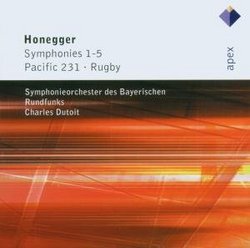| All Artists: Arthur Honegger, Charles Dutoit, Bavarian Radio Symphony Orchestra Title: Honegger: Symphonies 1-5; Pacific 231; Rugby Members Wishing: 0 Total Copies: 0 Label: Warner Classics Original Release Date: 1/1/2006 Re-Release Date: 8/22/2006 Genre: Classical Styles: Forms & Genres, Theatrical, Incidental & Program Music, Historical Periods, Modern, 20th, & 21st Century, Symphonies Number of Discs: 2 SwapaCD Credits: 2 UPC: 825646268726 |
Search - Arthur Honegger, Charles Dutoit, Bavarian Radio Symphony Orchestra :: Honegger: Symphonies 1-5; Pacific 231; Rugby
 | Arthur Honegger, Charles Dutoit, Bavarian Radio Symphony Orchestra Honegger: Symphonies 1-5; Pacific 231; Rugby Genre: Classical
|
Larger Image |
CD DetailsSimilar CDs
|
CD ReviewsGood Performances of Honegger's Fine Symphonies at an Astoni Doug - Haydn Fan | California | 11/17/2009 (4 out of 5 stars) "This may be my shortest review - my point is to bring this outstanding budget offering to everyone's attention! Four Star Performances - but Five Stars for the sensational price! For some reason Amazon fails to link this super bargain-priced 2006 duplicate offering of the Honegger Symphonies from Apex to the reviews of the same set on an earlier and now unavailable 1999 Elektra offering. You can find several full reviews of these performances at - Honegger: Symphonies 1 - 5, etc Briefly, the Honegger Symphonies continue to win converts, and rightly so! Honegger wrote wonderfully well for strings - his quartets are among the best of the first half of the 20th Century. In his symphonies the composer's trademark of heavy cross-hatching using extreme contrapuntal writing, very strong motor elements, and great nobility of purpose all make his symphonies a stand out among the genre. At this extremely inviting Apex price, in good performances by Dutoit, you can't go wrong. Dutoit, perhaps encouraged by Honegger's writing, does the music justice, playing with a bit more incisiveness and power than is this conductor's norm. The 2 Cd package offers not only all 5 of Honegger's symphonies, but two shorter symphonic works; "Rugby", his excellent short overture to English sport; and his famous ode to the fabled steam locomotives, "Pacific 231", a gigantic orchestra crescendo that on reaching full flight roars along at breakneck velocity till finally breaking to a slowing close. With so many new sets from Europe pushing 20 dollars per Cd, and even the so-called budget giant Naxos demanding ten dollars a Cd, this set's another example of what tremendous deals exist if you just look around! The funniest thing of all about this pricing - this Honegger 2 Cd set goes for 6.98 at Amazon uk also - but in Pounds, not dollars!" Honegger's cycle deserves a hearing -- the 3rd & 5th are sup R. Hutchinson | a world ruled by fossil fuels and fossil minds | 03/24/2010 (4 out of 5 stars) "Arthur Honegger (1892-1955) had a great career in Paris in the 1920s and 1930s, but only his first symphony is from that period (1930). It is an energetic 3-movement work of about 22 minutes, the least traditional of his five symphonies. A good start, but not among his finest. The rest of Honegger's symphonies were written during or shortly after WWII, the decisive shaping influence on his life and music after the German occupation. I consider the Third Symphony (1945-6) to be his masterpiece. It is full of anger, violence, tenderness and hope, and at about 30 minutes is Honegger's longest symphony. The Fifth (1950) is the other symphony of the cycle that I find to be powerfully compelling. It has dark passages, but is not as bleak as you might think reading about what Honegger brought to it. Not only was he in poor health, having suffered a major heart attack in 1947, but he was convinced that civilization was at an end because of the barbarism of the war and the new threat of nuclear weapons. In any event, the 3rd and 5th symphonies are both very strong works and well worth hearing. The Second (1941-2) and Fourth (1946) Symphonies make a symmetrical pair. The Second is somber and full of tragedy, reflecting the onset of the war, while the Fourth is sunny and light, reflecting the war's end and Honegger's restful time in Basel. Many consider the Second to be one of Honegger's finest symphonies along with the Third. This set also includes two short works from the 1920s which Honegger called "mouvement symphoniques." They are the famous "Pacific 231" (1924) and "Rugby" (1928), inspired by railroad locomotives and the sport, both of which Honegger loved. It would be quite appropriate to give this 2-disc set 5 stars given how much music it contains for the price (this Apex reissue replaces the earlier Ultima set). I am giving it 4 stars to indicate that the symphonies are not all equally good. Finally a few comparisons. Honegger is clearly more influenced by Modernism than the leading French symphonic composer of the earlier generation, Roussel. Honegger's writing is denser and harder to grasp than Roussel's, with the exception of Roussel's Second Symphony, his longest and most complex. These symphonies are roughly similar to Shostakovich in that they incorporate only some elements of Modernism, but Honegger lacks the force and memorable passages of Shostakovich's finest symphonies. While Shostakovich's Eighth is, I believe, the most powerful anti-war symphony of the 20th century, Honegger's Third can take a place alongside Martinu's Third and Prokofiev's Sixth as strong contenders. Karl Amadeus Hartmann is the other mid-century symphonist that Honegger can logically be grouped with, it seems to me. Honegger stayed in Paris and composed throughout the war, and Hartmann stayed in Munich throughout the war and composed, though his works were performed only outside Germany. Hartmann was of the Left, and Honegger, though part of the Resistance, does not seem to have been that political. But musically, given that Honegger's symphonies reflect the German classical tradition more than most French composers, and given that both men were reacting to the barbarism of their time in their music, the Honegger cycle and the Hartmann cycle have much more in common than either has with most everything else. In short, this set of Honegger's symphonies, the only available complete cycle, is well worth hearing. I have not heard alternative recordings, but Charles Dutoit leads the Bavarian Symphony Orchestra in fine performances." Honneger par excellence David Thierry | Chicago, IL United States | 03/05/2010 (4 out of 5 stars) "The French really haven't made an impact with the symphony with the possible exception of Berlioz Symphonie Fantastique which has remained in the concert halls while Frank's murky symphony in D and Saint Saens Organ symphony have been pushed aside by Mahler, Stravinsky, Bartok and other composers who captured the public in the latter half of the 20th century. These works by Honneger are comparable to and oddly sometimes sound like American symphonies from the same time period but without the awful folk references that trivialize so many American works. Here we have several works of typical French lightness and deftness but also some depth and poignance. It's not Beethoven and it's not Mahler, it's Honneger. To some it may be little more than wallpaper but it's French wallpaper. You probably already know Dutoit's reputation in the repertoire."
|

 Track Listings (9) - Disc #1
Track Listings (9) - Disc #1

